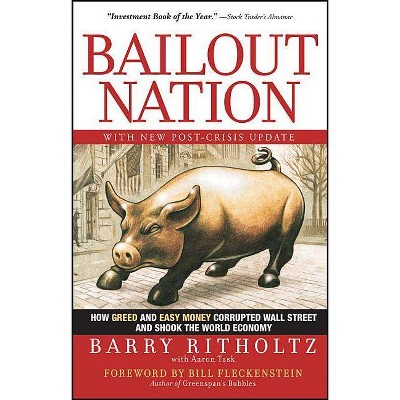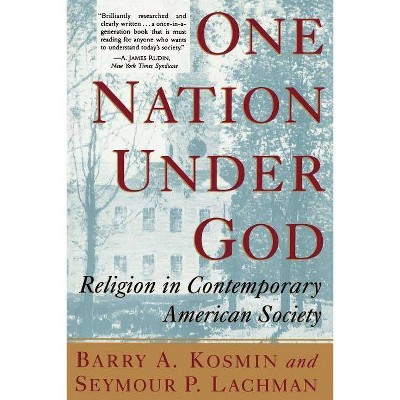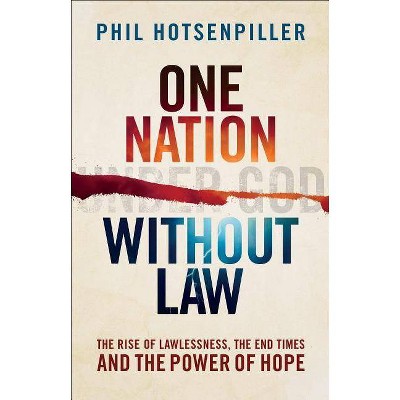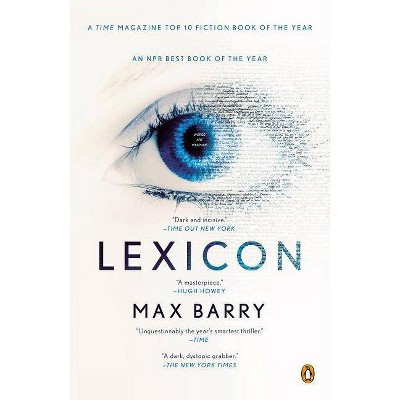Bailout Nation - by Barry Ritholtz (Paperback)

Similar Products
Products of same category from the store
AllProduct info
<p/><br></br><p><b> Book Synopsis </b></p></br></br><b>An engaging look at what led to the financial turmoil we now find ourselves in</b> <p><i>Bailout Nation</i> offers one of the clearest looks at the financial lenders, regulators, and politicians responsible for the financial crisis of 2008. Written by Barry Ritholtz, one of today's most popular economic bloggers and a well-established industry pundit, this book skillfully explores how the United States evolved from a rugged independent nation to a soft <i>Bailout Nation</i>-where financial firms are allowed to self-regulate in good times, but are bailed out by taxpayers in bad times.</p> <p>Entertaining and informative, this book clearly shows you how years of trying to control the economy with easy money has finally caught up with the federal government and how its practice of repeatedly rescuing Wall Street has come back to bite them.</p> <ul> <li>The definitive book on the financial crisis of 2008</li> <li>Names the culprits responsible for this tragedy-from financial regulators to politicians</li> <li>Shows how each bailout throughout modern history has impacted what happened in the future</li> <li>Examines why the consumer/taxpayer is left suffering in an economy of bubbles, bailouts, and possible inflation</li> <li>Ritholtz operates a hugely popular blog, www.ritholtz.com/blog</li> </ul> <p>Scathing, but fair, <i>Bailout Nation</i> is a voice of reason in these uncertain economic times.</p><p/><br></br><p><b> From the Back Cover </b></p></br></br><b>Praise for <i>Bailout Nation with New Post-Crisis Update</i></b> <p>Succeeds in laying out all that transpired in easy-to-understand language. If you want to know how we got into this mess and what might still be coming, this is the book for you.<br /> --<i>The Wall Street Journal</i></p> <p>The author writes with the fury of an insider mortified by the behavior of his heretical peers. . . . There is much to be said for the book's irreverence. Mr. Ritholtz has written an important book about a complicated subject, and yet you could still read it at the beach. Here's hoping that some policymakers in Washington take it with them on vacation this month.<br /> --<i>The New York Times</i></p> <p>Ritholtz makes a valuable new contribution to our understanding of how we arrived at this sorry juncture. He's smart, sassy, and often amusing. If you're looking for an all-in-one place explanation of what went wrong and why, this is the book for you (or your confused neighbor).<br /> --<i>Bloomberg</i></p> <p>Bailout Nation's straightforward, compelling account puts the crisis in context, explains why the U.S. government responded so stupidly, offers solutions, and advises how to prevent a repeat. Ritholtz's indictment of the financial and political establishment is devastatingly accurate.<br /> --<i>Asia Times</i></p> <p>Before the housing and credit bubbles popped, Barry Ritholtz, a lawyer turned blogger and money manager, was one of the voices crying in the wilderness. His caustic (and occasionally profane) blog, The Big Picture, dissected macroeconomic news and relentlessly cut through spin. His book takes a long view of the roots of the economic crisis, tracing the history of a series of ever more expensive taxpayer-funded bailouts of failed industries.<br /> --<i>Newsweek</i></p> <p>Ritholtz's book seeks to explain how the United States, once so proud, became a 'nanny state' for well-paid bankers. Ritholtz may be just the right person to explain the transition to both the disillusioned amateur and the finance junkie. He doesn't pull his punches or bury the truth in layers of finance-speak, caveats, and disclaimers. Anyone interested in understanding the roots of our current crisis should check out this book.<br /> --<i>Freakonomics</i>, <i>The New York Times</i> blog</p><p/><br></br><p><b> About the Author </b></p></br></br><b>Barry Ritholtz</b> operates one of today's most popular economic blogs, www.ritholtz.com/blog/, which has received over 50 million page views since launching. He is the CEO and Director of Equity Research at FusionIQ, an online quantitative research firm. He is a frequent guest on CNBC; a regular guest on <i>Fast Money</i>, <i>Kudlow & Company</i>, and <i>Power Lunch</i>; and author of the popular Apprenticed Investor column at TheStreet.com.
Price History
Cheapest price in the interval: 16.99 on November 8, 2021
Most expensive price in the interval: 16.99 on December 20, 2021
Price Archive shows prices from various stores, lets you see history and find the cheapest. There is no actual sale on the website. For all support, inquiry and suggestion messagescommunication@pricearchive.us




















